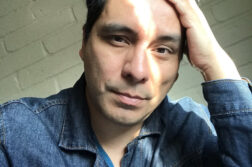Dan Mathews, vice president of the People for the Ethical Treatment of Animals (PETA), is the originator of many of that organization’s most controversial campaigns against animal cruelty, notably their “I’d rather go naked than wear fur” campaign. An openly gay man, Mathews has long seen a connection between the cause of animal rights and the struggle for GLBT equality. At the age of 42 he has already lived a varied and adventuresome life, one that has enabled him to travel extensively and also landed him in jail many times for his PETA demonstrations. Now he has written a memoir that describes some of these adventures, Committed: A Rabble-Rouser’s Memoir (Atria, 2007), which is as much about his activities as a gay traveler as it is about his activism in the fight against cruelty to animals. This interview was conducted over lunch in Boston this past April.
Gay & Lesbian Review: Let me start right in with what seems to me the central question. What do you see as the connection between gay rights and animal rights?
Dan Mathews: I think the connection is very clear in the way that many gays are sensitized to animal rights far more than most people. To me, it’s because gays have grown up with a very outsider view of the world, and they look at things in a way that’s informed by the cavalier attitude people often have towards gays. We know because we can lose our jobs; we can lose our housing; we can get gay-bashed. There’s a whole host of things that we’ve experienced growing up, having to lead double lives in some cases. People who have a cavalier attitude about cruelty to animals tend to have a similar attitude toward gay people and other minorities. So I think philosophically and emotionally gays should see the nasty attitudes towards animals and sympathize with them because they have been at the receiving end of that same attitude.
G&LR: You’re on a book tour now and meeting lots of people who come to your readings. Are you getting mostly gay people or animal rights people at your readings?
DM: I would say the readings I’m doing are half animal people and half gays at this point, which is great. The book I wrote is a very gay book all the way through. Then if we look at the spokespeople that PETA, a non-gay organization, has drafted over the years, we’ve had k.d. lang, Lady Bunny, and Boy George do our ad campaigns. We featured Melissa Etheridge and her girlfriend at the time, Julie Cypher, in an anti-fur ad, an openly lesbian couple, which rocked a lot of boats. So I think it’s been a two-way street, because PETA has always embraced the gay community in our campaigns. We must be the gayest non-gay group out there.
G&LR: Not the Interior Decorators’ Association of America? You’ve talked about a kind of personal connection between your experience coming out as gay and becoming an animal rights activist that goes back to childhood. Can you talk about that a little?
DM: Sure. When I was growing up and especially in junior high school I was always the odd man out; I was the guy that they pegged. I used to get harassed a lot, but it was the same guys beating me up who were mutilating alley cats. It didn’t really matter who they were cruel to. One day as I was walking between classes, somebody just for fun hauled off and struck me in the stomach and I doubled over on the ground. Gasping for breath, I looked up and all I saw was a bunch of faces looking down at me and laughing. I was completely helpless.
About a month or so later I was on a fishing trip with my dad and I caught a giant flounder, which is kind of a booby prize fish. When I hoisted him onto the deck, everybody kind of laughed. Somebody stomped on him and ripped the hook out and everybody was just looking down laughing at this pathetic creature lying on the deck, gasping for breath. In that instant I realized that that flounder was me, only now I had become the bully. When you see a creature struggling to survive, based on your own actions, yanking him out of his natural world on a fishing line, and knowing I was responsible for that, my heart broke and I never ate fish again. I soon became a vegetarian, and this was directly related to the attitude that people had toward me in school.
A lot of people get their rocks off by being able to exert power over something that’s less powerful. Some men do it with their wives, their girlfriends, their children. They’ll strike at whomever they can exert power over, whether it’s hunting animals or bullying fags. These things happen every day all over the country and it’s pretty appalling. I think children have a pretty reckless attitude about other living things. Most kids learn empathy and become decent human beings, but some of the dimmer ones compensate for their low self-esteem by being vicious and by striking out wherever they can, whether against gays or animals.
G&LR: What happened then? How did your involvement with PETA come about?
DM: Well, I was raised by a mother who made sure at the youngest age that my brothers and I knew what was going on in the world, knew the problems, whether political or social. When Anita Bryant got hit in the face with a pie by gays protesting her fight against the anti-discrimination bill in Florida, my mother cheered and explained the whole controversy to us. I think most parents shy away from discussing such things with their kids, but she made us very aware of it early on. So I always thought that this would be the most well-spent life, fighting for social change, fighting for justice. The more I learned about animals’ suffering in the meat trade and the diabolical things that were being done to them in laboratories, the more involved I became.
As I grew up, I could see more and more clearly how self-destructive human beings can be. We’re such a freaky species with all the wars we wage, the risks we take. People get so fat that they practically explode with heart disease. I look around and see a pretty self-destructive species that’s also waging war on animals, even though animals haven’t done anything to deserve it.
G&LR: Maybe you can talk a bit more about your book, since you are on a book tour right now. It’s an autobiography of your life to date, and it focuses a lot on your PETA experiences—the protests and demonstrations, some of them very colorful, that you’ve been involved in. You mentioned that it’s also a very gay book because being gay somehow seems to be an integral part of your experience in the animal rights movement.
DM: I actually wrote this book only after having written articles for a lot of magazines, like the Advocate and Genre for which I wrote a column and Out magazine. The columns got a lot of attention, and they weren’t necessarily about specifically gay things or animal rights, but just about odd encounters that I would have on the road, interesting situations. I would begin writing these Mark Twain-like dispatches from wherever I happened to be about the odd people that I encountered, and that’s what led to an offer from Simon & Schuster to do a book about it. It’s pretty gay throughout but in a rather casual way. There’s one chapter about my travels with Lady Bunny around the world, one about my coming out, and one about hustling the streets of Rome when I was seventeen and didn’t have any money but wanted to stay in the country. So I learned how to thumb a ride to make a little lunch money, but never being apologetic for it and just kind of following my heart. I’ve always been out in my career, and I wish more people would be, too. I hope that it inspires some people to feel like they can be out in their position, even if they aren’t necessarily in a gay world.
The other big thing is that I felt a lot of resistance when I was becoming involved in animal rights. I didn’t want to become one of those earnest types who’s always talking about some awful thing that is going on in the world. I felt a responsibility to address it, but I also felt a responsibility to the selfish part of myself that just wanted to have fun like everybody else. I’m a good-time guy. I like to go out and get crazy with friends. There was a struggle that’s pretty evident in the book, where I didn’t see how the two of these things could coexist, and how I was able to overcome that. So even though I’m a “cause” person, I’ve always fought against being one of those bores who only talks about the cause or who only hangs around with other activists.
G&LR: PETA has been remarkably effective in mobilizing people through the use of colorful demonstrations and eye-catching agitprop. Does the GLBT rights movement have anything to learn from PETA about the methods and techniques that can bring about social awareness and political change?
DM: Absolutely. I think one of the big things is that a lot of movements end up preaching to the converted, and I think the most important thing for any movement is to reach out to people who don’t get it. I think that is one of the big mistakes of the whole gay marriage campaign, because there wasn’t the foresight to see how this actually will play out in the country and how legislators can use it to oppose us. If you’re going to pursue this goal, pursue it in ways that make it a little bit more user-friendly. Get Elizabeth Taylor to do an ad saying, “Marriage is a mistake; everyone should be entitled to one.” Make it more of a lifestyle thing as opposed to something that’s just grim agitation, which is going to meet a lot of resistance. I think it’s important for people guiding a movement to have one foot in the outside world and one in their own world, and to build a campaign based on how the real world could embrace our cause most easily.





